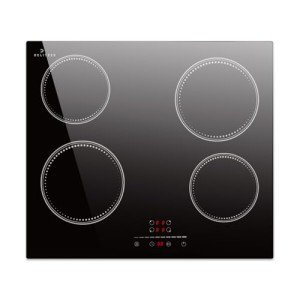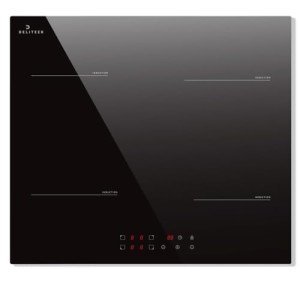Deliteer hobs have become a popular choice for modern kitchens, combining functionality with sleek designs. As home cooks and professional chefs seek to optimize their cooking experience, understanding the features, benefits, and types of Deliteer hobs is essential. This guide delves into the world of Deliteer hobs, their advantages, comparisons with traditional cooking methods, and answers to frequently asked questions.
What are Deliteer Hobs?
Deliteer hobs are advanced cooking appliances that utilize innovative technology to provide efficient heating and cooking options. These hobs are characterized by their sleek surfaces, intuitive controls, and customizable cooking zones. They often feature induction cooking, which uses electromagnetic fields to directly heat pots and pans, providing quick and precise temperature control.
Key Features of Deliteer Hobs
| Feature |
Description |
| Induction Technology |
Directly heats pots and pans, improving efficiency and safety. |
| Touch Controls |
Intuitive touch-sensitive controls for precise temperature adjustments. |
| Flexible Cooking Zones |
Customizable cooking zones that can accommodate various pot sizes and shapes. |
| Timer Functionality |
Built-in timers for better cooking precision and ease of use. |
| Safety Features |
Automatic shut-off, child lock, and overheating protection for peace of mind. |
| Sleek Design |
Modern and minimalist aesthetics to complement any kitchen decor. |
Advantages of Deliteer Hobs
-
Energy Efficiency: Induction cooking is known for its energy-efficient design, as it transfers heat directly to cookware, reducing wasted energy.
-
Speed: Cooking with Deliteer hobs is faster compared to traditional gas or electric stoves. The direct heat allows for rapid boiling and searing.
-
Easy to Clean: The smooth surface of Deliteer hobs makes cleaning a breeze. Spills do not burn onto the surface and can be easily wiped away.
-
Precise Temperature Control: Chefs benefit from the precision that induction provides, allowing them to achieve consistent cooking results for delicate dishes.
-
Safety: With features like automatic shut-off and child locks, Deliteer hobs are safer for families, reducing the risk of burns and accidents.
Types of Deliteer Hobs
Deliteer hobs come in various types, each offering unique features and benefits. Below is a comparison table of the most common types available in the market:
| Type |
Heat Source |
Benefits |
Considerations |
| Induction Hobs |
Electromagnetic |
Fast heating, energy-efficient, precise control |
Requires compatible cookware |
| Ceramic Hobs |
Radiant energy |
Attractive appearance, even heat distribution |
Slower heating than induction, needs more maintenance |
| Gas Hobs |
Combustion |
Instant heat, traditional cooking style |
Can be less user-friendly and less efficient |
| Electric Hobs |
Electric coils |
Cost-effective, common in many homes |
Takes longer to heat up than induction |
| Mixed Fuel Hobs |
Induction and gas |
Flexibility in cooking options |
Requires more installation space |
Factors to Consider When Choosing a Deliteer Hob
-
Size and Configuration: Evaluate your kitchen space and cooking habits. Consider how many cooking zones you need and the overall size of the hob.
-
Power Rating: Look for a hob with a suitable power rating that meets your cooking preferences. Higher power ratings often provide faster heating.
-
Control Type: Decide between touch control and traditional knobs based on personal preferences for convenience and ease of use.
-
Cookware Compatibility: If opting for an induction hob, ensure that your cooking pots and pans are compatible with induction technology.
-
Maintenance: Consider how much maintenance you are willing to do. Induction hobs are easier to clean, while gas hobs may require more upkeep.
Frequently Asked Questions (FAQ)
Q1: What is the difference between induction hobs and gas hobs?
Induction hobs use electromagnetic energy to heat cookware directly, while gas hobs rely on a flame for cooking. Induction hobs are generally safer and more energy-efficient, whereas gas hobs provide instant heat and a traditional cooking experience.
Q2: Do I need special cookware for induction hobs?
Yes, for induction cooking, you need ferrous cookware (magnetic). Cookware made of materials like iron or some stainless steels work well, while aluminum and glass require a magnetic base.
Q3: Are Deliteer hobs energy efficient?
Yes, Deliteer hobs, especially induction ones, are highly energy-efficient as they heat up cookware directly rather than warming an entire cooking surface.
Q4: Can I install Deliteer hobs myself?
While some homeowners may attempt to install hobs themselves, it is recommended to hire a professional for gas and electrical installations to ensure safety and compliance with local regulations.
Q5: How do I clean Deliteer hobs?
Deliteer hobs can be easily cleaned with a damp cloth or sponge. For tougher stains, a gentle scraper can be used to avoid damaging the surface.
Deliteer hobs have revolutionized home cooking by offering a combination of speed, efficiency, safety, and modern aesthetics. Whether you are an amateur cook looking to upgrade your kitchen or a professional chef seeking precision, understanding the options and features available can significantly enhance your cooking experience. With the right information and careful considerations, you can make an informed decision that will benefit you in the kitchen for years to come.

